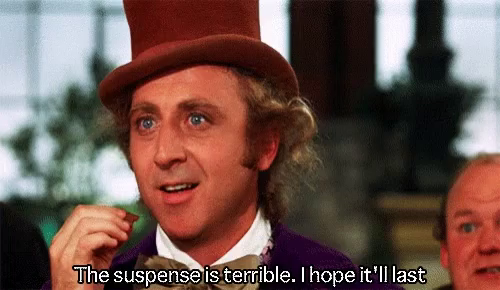One of the elements that separates humanity from the rest of the creatures on the Earth is our wonderful ability to use our language to craft works of fiction. From the legends of ancient mythology through to works of art found on the page and on the screen today, we’ve always had a talent at not only imagining other worlds for ourselves but making it possible to share those imagined worlds with each other. Gathered around a campfire, our most ancient of ancestors likely spent their evenings telling tall tales of the world around them either to entertain or explain the mysteries of nature. And, despite the power of that imagination, it’s nearly impossible to imagine there wasn’t someone around that campfire bitching about spoilers.
Don’t get me wrong, I understand. The relationship between the story teller and their audience is incredibly personal if done well. The story teller does everything they can to try to draw the audience in and the audience, if they’re invested, revels in being able to be pulled into that world. The idea that the experience could somehow be derailed by a third party is infuriating for some and that makes sense. But there’s a problem I’ve been noticing as of late:
We’re taking it all too far, and I’m not sure if we even have to…
Spoiling Ourselves

It used to be that finding spoilers was actually something that required you searched for it. Before the internet they were almost impossible to encounter in the wild, with newspapers and magazines knowing damn well not to reveal anything. Even in the early days of the internet it was difficult to find one accidentally since the only people who would share information would be specific fan-sites devoted to it. There may have been a chance that you would have a friend spoil it for you, but that friend would usually know when to shut their mouth. It was certainly a simpler time for everyone.
Today, things have changed dramatically as the most popular websites are a melting pot of interests, cultures, and attention grabbing. When it’s so easy to get information it’s just as easy to accidentally stumble on information you don’t even want yet. This is especially true in the recent years when sites are constantly competing for your clicks and that means they’ll try to put out every shred of unique information as early as they possibly can. Did someone steal the manuscript to an upcoming book? That’ll be a couple thousand clicks at least. Have there been leaked copies of a blockbuster hit? It may be known to be taboo, but the traffic must flow. And comic book publishers sometimes release press releases with the biggest twists in the headline now.

So, of course, the spoiler warnings became a necessary evil. With so many of these websites, social media accounts, and YouTube channels trying to get the information out first it became fairly easy for someone to stumble on information they didn’t want to find. And, after enough complaints, people started to habitually put in the spoiler warning before any information they have. Sometimes, these spoiler warnings go far beyond rational. If you’re posting a video titled “easter eggs in [the current blockbuster hit]” – there’s a damn good chance there are spoilers in it. In fact, in a stroke of complete insanity, I’ve even seen spoiler warnings on videos that were talking about the endings of movies and television series – clearly marked as talking about the ending, and yet you’re concerned that people might watch it and not realize there are spoilers. Sometimes this even happens when the analysis is being done for a book, movie, or TV show that’s several years or even a decade old!
But who can blame the people posting those warnings, really? In the last few years we’ve lost perspective to the point that spoilers have become borderline acts of war. Recently, with the release of Avengers: Endgame, I was made aware of not one but two assaults over spoilers. Worse, these were not contained to a single country or culture – one happened in Texas and the other happened in Hong Kong! And it’s not even just reserved for strangers: I’ve even watched some people threaten to end friendships over spoilers. Who cares if you spent 10 years building that relationship – they ruined five minutes of a three hour movie and you’re well within your rights to end them!

How is it that our popular culture has become something so visceral and toxic that this is considered an acceptable response?
The science of it suggests that a lot of our knee-jerk reaction is actually a bit of an overreaction. Researchers have gone back to this subject several times, especially in the last ten years, and found a complicated but nuanced picture in the process. One set of studies state that spoilers either don’t impact your enjoyment of a story or even enhance it. However, other studies have shown that spoilers do have a negative impact on your experience. These seem like two starkly contrasting results, so how is it they can both be true? Well, if you look at the study showing the negatives and the one with positives and the questions they ask, you’ll start to notice something: they’re both measuring the experience differently. The positive results ask the subjects how much they enjoyed the story, but the negative results asked if they felt emotions like “suspense”.

Effectively, the impact of the spoiler isn’t how much you enjoy it but how you experience it. You aren’t surprised anymore, but you can have more fun when you’re free to notice or appreciate elements that wouldn’t stand out to you on a first viewing. And, if you think about it, you know this experience all too well because it’s how you see things when you read or watch something multiple times. Consider that you don’t like a movie, show, or book less on a repeat viewing but rather you see things that you hadn’t noticed the first time around. This is a pretty common experience often punctuated with cries of “I missed that the first time” every few scenes. So we know, on some level, that we won’t actually like something less just because we know a few elements here or there.
Still, doesn’t make the response any less visceral, does it?
The theory I’ve come to adopt as of late is that it’s less about the spoilers and more about where the information comes from. We know, deep down, that it won’t really ruin our entertainment to know a few things here or there but we want to be the ones to make that decision. If you choose to read the spoiler or take part in that conversation, you have control over the nature of your experience. It’s only really a problem when someone has forced that information on you, changing your experience without consent. In the end, it’s kind of about control – which is why the most egregious of spoilers tend to come out of trolls.
Unfortunately, that last part is probably key to why people have become so toxic. In a world where some get their entertainment by trying to provoke responses out of others, the intention of the spoiler is always a little suspect. And, because it’s suspect, many of us often behave in a fashion we would if someone were trying to upset us. Where as it was once possible to be annoyed but not suspect hostile intent, it’s sadly easier today to just assume that everyone is doing it to be a dick. Still, despite all of that, it’s probably a good idea to remember…
That our responses can be worse than the offense.
(I write novels and dabble in screenplays. Spoiler alert: I’m about to have an announcement about that if you go over and follow my twitter.)







